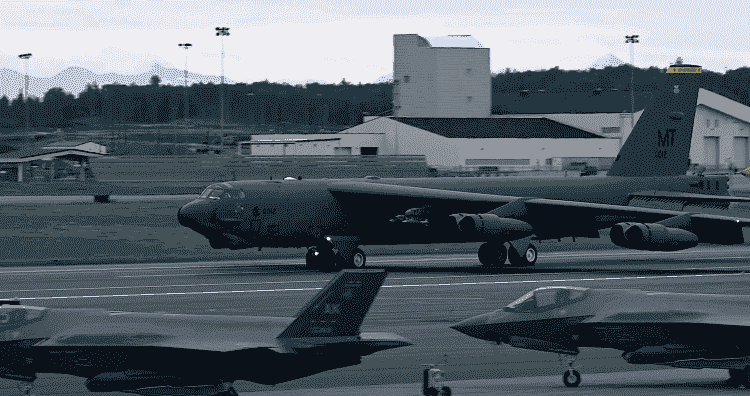
US Air Force B-52 strategic bomber landed on the Korean Peninsula for the first time, underscoring the United States’ unwavering commitment to regional stability.
This significant event followed a flyover at a defense expo in Seoul and joint exercises with South Korean fighter jets, marking a display of solidarity and support.
B-52 Bomber Lands on Korean Peninsula
The impressive nuclear-capable B-52 bomber touched down at Cheongju Air Base, a mere 70 miles south of the bustling South Korean capital, Seoul. Earlier in the day, it had soared over Seoul Air Base, inaugurating the 2023 Seoul International Aerospace and Defense Exhibition, set to run until the upcoming Monday.
Major Rachel Buitrago, a spokeswoman for the US 7th Air Force, highlighted the importance of these activities, stating, “These actions are part of our ongoing commitment to promote peace, stability, and prosperity on the Korean Peninsula,” echoing a statement released by U.S. Forces Korea.
The B-52 is renowned for its nuclear and conventional capabilities. It can fly at heights of up to 50,000 feet and has an 8,800-mile combat range between refueling stops. Although B-52s have performed flyovers during training exercises in the Korean Peninsula before, this landing is a historic first.
Read more: US Military On High Alert: 2,000 Troops Readied For Possible Deployment In Israel-Hamas Crisis
Geopolitical Complexities in the Korean Peninsula

Moreover, the B-52 engaged in joint air exercises alongside South Korean F-35A fighters, showcasing the exceptional operational capabilities of the South Korean and U.S. Air Forces.
This collaboration reinforces the United States’ commitment to extended deterrence, which signifies employing all available capabilities, including nuclear options, to protect South Korea from potential threats originating from the North.
These actions align with the Washington Declaration, a nuclear cooperation pact signed by South Korea and the United States in April.
The agreement seeks to bolster the presence of American strategic assets on the Korean Peninsula, further underlining the commitment to regional security.
As part of this broader effort, the USS Ronald Reagan aircraft carrier arrived in the southeastern port city of Busan, a move that elicited a sharp response from North Korea, warning of catastrophic consequences.
These developments reflect the intricacies and ongoing tensions in the geopolitical landscape of the Korean Peninsula, where regional security remains a paramount concern.
Read more: President Biden To Visit Israel And Jordan Amid Escalating Fears Of Conflict Expansion

